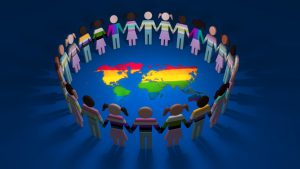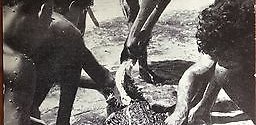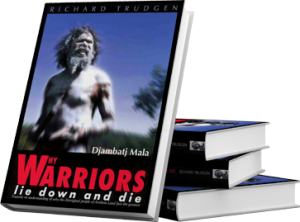
Some may think cultural competency is the same as cultural awareness. However cultural awareness is only one small aspect of it. Cultural competency teaches a whole range of knowledge and skills that are not covered in most general cultural awareness courses.
To understand this we first need to look at what is culture.
Some people deny that they have culture and think it’s just other people or ‘that group over there’ that are strange and different. It becomes easy to presume that ‘they’ have culture and ‘we’ don’t.
So what is culture?
Culture is our habits of youth. It’s what we grew up with, the way we speak, what we like eating, how we dress, communicate and interact. It’s the sum total of our way of living, behaviours and beliefs that makes us a person.
However various groups of people around the world do many of these things in very different ways and so we have a range of diverse cultures.
It was our home communities that taught us to believe what is right, what is wrong, how to look at the world around us, and a whole raft of other things. What we now hold to as true, right, and even precious is our culture. We all have culture because every human group develop these different habits of youth that they carry forward with them into adult life.
Now this is not a problem if we live in our own home community and never mix with other people. But in a modern day world where we live in multicultural communities, are employed in culturally inclusive workplaces, or travel to other countries we need to learn a new way of seeing, acting and communicating. This is called cultural competency.
When we look at these various groups and cultures we see that some can be just a little bit different where others are vastly different. When it comes to mainstream Australian culture and the Original Australian culture you could say quite easily that they are worlds apart from each other.
Real cultural competency teaches three main things; mindfulness, knowledge and skills.
Mindfulness
The concept that we all have culture is just one example of what mindfulness can teach us. It seems simple yet until we can see this clearly each of us are in danger of abusing and offending people of other cultures. If a person thinks they don’t have culture then it’s far too easy for them to take an arrogant offensive stand, assuming that their way of thinking and behaving is the only right one.
Yet some of these presumed ‘morally right and correct’ ideas and actions might be considered totally immoral and offensive to people the eother group.
This sort of abuse or offensiveness can even occur inter-generationally within what is normally considered one cultural group. For example, if you take all the older people in one cultural group and teenagers in that same group the chances are the way they speak, the words they use, and how they interact could be offensive to each other. Being culturally competent helps us to be mindful of the way our words and actions can offend people in “different” cultural groups.
Being mindful is also understanding “The Grey Zone” that exists between cultures. It’s important to know when you have entered this zone, and how to act and react while you are in it so you can be productive and return safely home without harming others.
Knowledge
The second thing that good cultural competency teaches us is new knowledge about intercultural dynamics. This covers what makes us different culturally, such as different languages and worldviews, prehistory, living environment, religion, body space, cross-cultural naming, how we understand family, cross-cultural communication and culture shock.
Skills
The third aspect to cultural competency is the learning of new skills. Some of these skills involve new tools to analyse different cultural aspects, some of the ‘do’s and don’ts’ of a particular culture but the most important skills are learning new cross-cultural communication methods, including body language.
Cultural Competency training
Entering a strange cultural world can be very stressful and people need cultural competency training to be able to cope with it. Without it most people will experience culture shock potentially leading to psychological and physical breakdown. They will also be more likely to abuse and highly offend the people of the other culture.
When a person is culturally competent they are prepared and ready to meet, work with, and learn from people of another culture. They can recognise that a different communication and interaction mode is in play and have the skills to mimic the cultural ways of the other group.
If a culturally competent person makes a mistake they are more ready to recognise that there are different ways of doing things and these differences are okay. So they’ll also be ready to apologise and move on.
Cultural competency & cultural awareness
Effective cultural competency training is very different from most cultural awareness programs. Cultural awareness programs usually just teach small amounts of local content and basic skills, or the “dos and don’ts” of a particular cultural group of people, without any deeper understanding of the “why” behind culture. That is they tell people to do this and don’t do that without explaining the why.
Cultural competency training teaches the human dynamic differences between cultures which allows you to be more ready, willing, and able to learn local content, from the local people, of a particular cultural group in a more productive way.
Cultural competency training prepares you to live, work, learn, and survive in a multicultural world and also in vastly different cultural situations.
Conclusion
Good cultural competency training is essential in a modern-day context wherever we live. However, for people working with diverse cultural groups, it is absolutely essential. Without it two way abuse will occur, many times without people even knowing it. Please see the video on “The Beckoning Finger”.
Richard Trudgen, © March 2016




Bethany Kinsela •
Hi there,
I would love some advice for position working at Perth Zoo. They tell me they only want local people, but the position doesn’t stipulate Traditional Owners – it’s just Aboriginal.
I am Aboriginal. I am a fully qualified trainer/assessor, executive engagement officer after working as a Level 7 TAFE lecturer. I am interested to know how to approach the heirarchy in education at the Zoo about how Aboriginal culture is not all the same, we are diverse too – as are the Aussie animals at the Zoo. I grew up on this Land since I was a three year old. My heritage is four hours north of Perth (Nhanda Yamatji), but my great-grandmother was Yuet Noongar. I like my job but I want to assertively and tactfully approach an explanation that my talent is hard to find and I have too much to offer in a non-political way by explaining that growing up and being adopted by Whadjuk Noongar people, I am just as Noongar as the people who have adopted me on Country…? I have no idea how to approach this without negative impact or their judgement or repercussions – again. We’re diverse as Aboriginal people. We are also similar. Why can they not accept me for who I am.
Any thoughts?
Thank you.
Beth